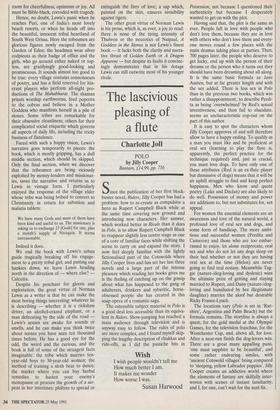The lascivious pleasing of a flute
Charlotte Joll
POLO Since the publication of her first block- buster novel, Riders, Jilly Cooper has had a problem: how to re-create as compulsive a hero as Rupert Campbell Black while at the same time covering new ground and introducing new characters. Her answer, which worked better in Rivals than it does in Polo, is to allow Rupert Campbell Black to reappear slightly less centre stage as one of a core of familiar faces while shifting the scene to carry on and expand the story. I now feel deeply familiar with the lightly fictionalised part of the Cotswolds where Jilly Cooper lives and has set her last three novels and a large part of the intense pleasure which reading her books gives me is the feeling of catching up on the gossip about what has happened to the gang of adulterers, drinkers and sybaritic, horse- obsessed people she has created in this soap opera of a romantic saga. The ostensible subject material in Polo is a good deal less accessible than its equiva- lent in Riders. Show-jumping has reached a mass audience through television and is anyway easy to follow. The rules of polo are more complex, and I found myself skip- ping the lengthy description of chukkas and ride-offs, as I did the pastiche bits in Possession, not because I questioned their authenticity but because I desperately wanted to get on with the plot.
Having said that, the plot is the same as ever. People fall in love with people who don't love them, because they are in love with others who don't love them and every- one moves round a few places with the main dramas taking place at parties. Then, 700 pages later, the people who deserve to get lucky, end up with the person of their dreams or the person who it turns out they should have been dreaming about all along. It is the same basic formula as Jane Austen, but at far greater length and with the sex added. There is less sex in Polo than in the previous two books, which was rather a disappointment; to describe Perdi- ta as being 'overwhelmed' by Red's sexual inventiveness, and then fail to elucidate, seems an uncharacteristic cop-out on the part of this author.
It is easy to spot the characters whom Jilly Cooper approves of and will therefore allow to have a happy ending. To qualify as a man you must like and be proficient at oral sex (learning to play the flute is, apparently, the perfect practice for the technique required) and, just as crucial, you must love dogs. To have only one of these attributes (Red is an ex-flute player but dismissive of dogs) means that it will be an uphill struggle to find and keep perfect happiness. Men who know and quote poetry (Luke and Declan) are also likely to do well. Possession of money and power are additions to, but not substitutes for, sex appeal.
For women the essential elements are an awareness and love of the natural world, a profound love of oral sex and dogs, and some form of handicap. The more ambi- tious and successful women (Perdita and Cameron) and those who are too embar- rassed to enjoy, let alone reciprocate, oral sex and who do not let any dogs sleep on their bed whether or not they are having oral sex at the time (Helen) are never going to find real ecstasy. Meanwhile Tag- gie (nature-/dog-loving and dyslexic) wins the ultimate prize of getting and staying married to Rupert, and Daisy (nature-/dog- loving and humiliated by her illegitimate daughter) marries the aloof but desirable Ricky France-Lynch.
The locations vary (Polo is set in 'Rut- shire', Argentina and Palm Beach) but the formula remains. The storyline is always a quest; for the gold medal at the Olympic Games, for the television franchise, for the Westchester Cup, and, above all, for love. After a near-run finish the dog-lovers win. There are a great many appalling puns, `one must sapphire to be beautiful', and some rather endearing similes, with `ancient Cotswold villages' being compared to 'sleeping, yellow Labrador puppies'. Jilly Cooper creates an addictive world where the elements of fantasy are skilfully inter- woven with scenes of instant familiarity, and I, for one, can't wait for the next fix.


















































 Previous page
Previous page